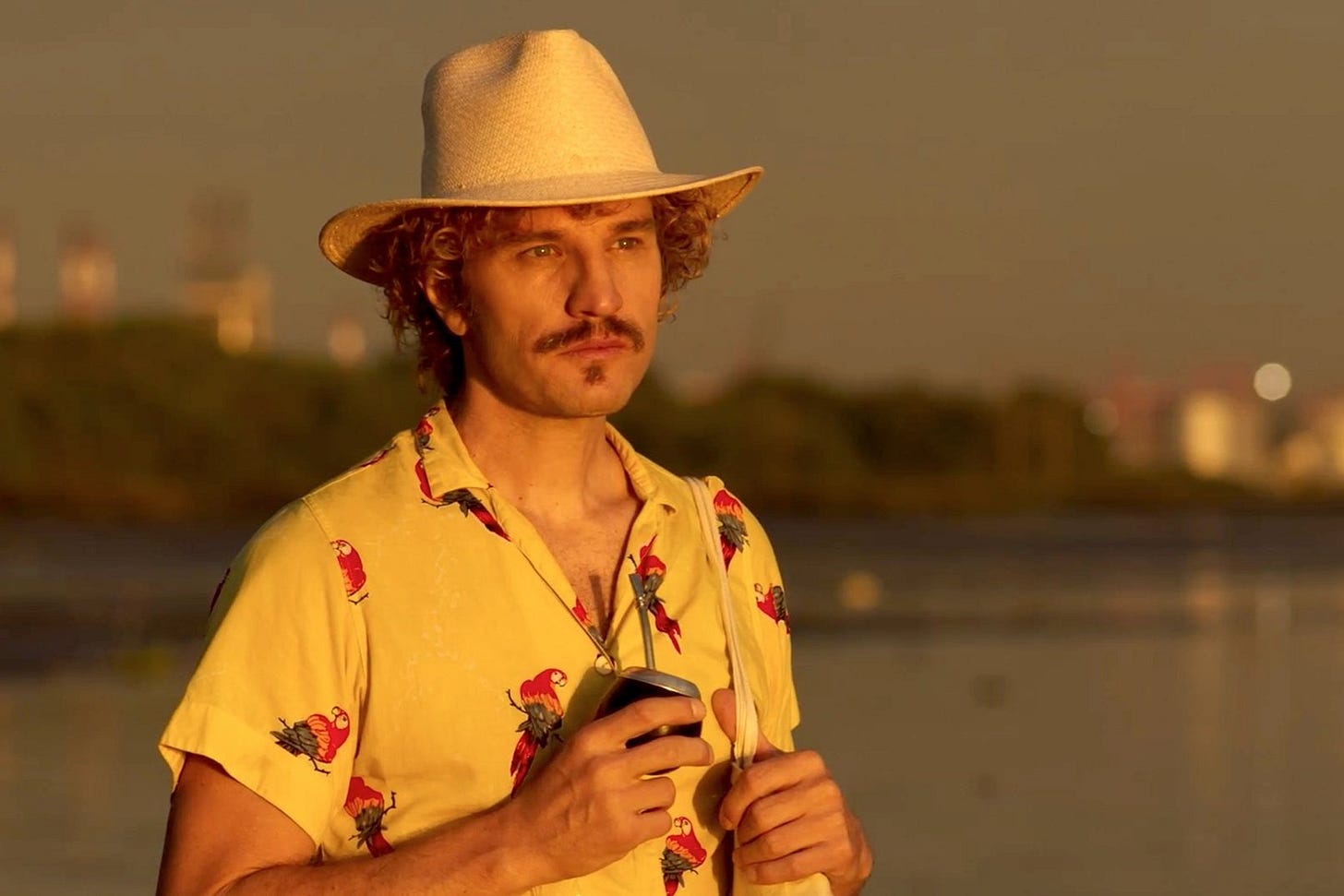"Polyamory is not a Band-Aid to fix a monogamous relationship."
Filmmaker Michael Taylor Jackson discusses his sexy, genderqueer political crime comedy 'Bajo Naranja,' the power of manifestos in art and activism, and why we need better polyamory representation.
When I chatted with Michael Taylor Jackson about his debut movie Bajo Naranja (Underground Orange) earlier this month, it was the Monday after he had his first North American screening in Toronto—which included a talkback with legendary queer filmmaker Bruce LaBruce—followed by another screening event in New York City. It was also while the Trump administration was escalating threats to U.S. citizens by sending armed soldiers to crush the protests taking place in Los Angeles.
Despite this, Michael is full of joyful energy, much like the character he portrays in the film: earnest and funny, creative and cool. The fact that he’d made a movie about a group of people on the margins who take to the streets to combat transparent corruption and the tendency of authoritarian regimes to incite terror seemed especially prescient.
“Being with Bruce was so special—because he created this feeling that you could fight to be queer,” Michael explained. “That there was an element of queerness that was activism, a punk activism… The same with Basquiat and Keith Haring. They were going around and spray painting love on the streets.” At that point he showed me his colorful fingernails, one of which was painted with an iconic “Radiant Baby.”
"People seem to be in a state of almost-hopelessness,” he continued. “And I think it's an important time to reflect on what we can do about it. Not just as queer people. But as people who are feeling disempowered and disenfranchised.”
In the movie—which he wrote and directed—Michael plays a Californian backpacker (named Yanki) who travels to Buenos Aires to pay homage to the Argentine pirate who conquered his hometown of Monterey in 1818. Along the way, he becomes involved in a polyamorous relationship with a band of sexy young actors who conspire to kidnap the United States ambassador.
Watching it, I detected clear references to Bruce LaBruce’s The Raspberry Reich as well as echoes of John Waters’ Cecil B. Demented and Gregg Araki’s The Doom Generation. Yes, it’s a quirky movie that will appeal to fans of those filmmakers, as well as anyone who can’t get enough of Jean-Michel Basquiat in Downtown 81.
We went on to discuss Hannah Arendt’s reporting on the Eichmann trials and the “banality of evil,” as well as The Ethical Slut and polyamory, very different books with distinct concepts that inspired the script for his artsy, genderqueer Spanish-language movie.
Michael grew up in Monterey, California, and was always curious why all the streets and locations had Spanish names but nobody around him spoke the language. He’s now fluent in the language—and even has a convincing Argentinian accent—and began working on the movie while stuck in Argentina during the pandemic after finishing his film degree at Brooklyn College in 2019.
In particular, I was curious about the origins of the manifesto he wrote for the film in 2021, which he says became an important queer manifesto for him and others. In the manifesto, he states that the movie Underground Orange points toward “the contradictions of an increasingly deceptive world where the internet is real and the news is fake, where the medium confuses the message” and goes on to state:
“Queer people—and by this term we mean people embodying unconventional sexualities, genders, fashions or forms of romance—everywhere still live in fear of public shame and brutality in the same way that poor people everywhere still pay off the debts of the rich.
Monogamy still reigns in a world where binary love is just a social construct meant to protect private property.
But love is not a possessive bond between two people any more than a love affair is a healthy transgression to save a marriage, or the black market is a sane alternative to cure an economy that continues to be the food of vulture funds. So why do we live in a bubble?”
So is that a motto that you live by as well?
"I first wrote a sort of contemporary surrealist-style manifesto, which is mixed into the politics of my film," Michael explained. "More than anything, I was interested in what is 'post-truth' and the emotional reaction to truth. It doesn't matter if it's facts or not—it's ‘true if I feel it's true.’ That's basically what the internet has become, unfortunately. And mix that with how, as a society, we often legalize our perversions, and we punish what heals us.”
As Michael went on to point out, he’s curious about what will be illegal in 10 or 50 years and vice versa. “Like, for example, homosexuality was illegal for many years—and still is in many parts of the world—and was punished as a hedonist crime. But slavery used to be legal. You go, ‘Wow, that’s a technology that was legal for thousands of years.’ At what point do humans realize the moral implications of their contradictions?”
Is that why it was so important to center the narrative on a queer polyamorous group of artists?
"My own monogamous relationships just weren't working in New York," he explained. "But a lot of the polyamorous movies that we see, they are pretty much centered on a monogamous couple who opens up their relationship and tries to bring in a third or another couple. Polyamory is not a Band-Aid to fix a monogamous relationship."
He further detailed the research he uncovered about a group of queer women in the 1970s who, along with a few queer men, splintered from the radical Weather Underground Organization and started their own far-left communist offshoot called M19CO (so named after Malcolm X's May 19 birthday). "They were literally an anti-imperialist group that planted a series of bombs, including one in the Capitol Building. Nobody was injured, but they served time in jail, and they dyed their hair ‘underground orange,’ which is where I got the idea for the title."
According to Michael’s research, the organization was poly and even had group orgies so they could psychologically dispossess themselves of one another. “That’s why I wanted to explore the polyamorous element,” he explained. “Because love is not a possession or a bond.”







